- Home
- Simon Kernick
A Good Day To Die Page 30
A Good Day To Die Read online
Page 30
‘No thanks. This is the end of it. We won’t be talking again.’
‘Suit yourself,’ he said.
I said I would and hung up. Then switched off the mobile and chucked it towards the gnarled old trees. It was someone else’s problem now.
I drove north until eventually I came to the North Yorkshire Moors. It was there, amidst cold bleak hills, with not a tree or dwelling in sight, that I opened up the boot and told Theo Morris that he could go.
‘Where?’ he asked.
‘Wherever you like,’ I said. ‘But go now while I’m still feeling charitable.’
That did the trick. He jumped out and without so much as a backward glance took off in the direction of an undulating valley below. He might have been cold, tired and lost, but I guessed that he was also extremely relieved.
I got back in the car and continued to drive.
Epilogue
THREE WEEKS LATER
It was late afternoon on Christmas Eve and raining steadily as the car pulled up at the end of the track and came to a halt. The driver was only partly visible through the fogged-up windscreen as he scanned the surrounding undergrowth for signs of activity.
I waited thirty seconds, then stepped out from behind a nearby beech tree and made my way over to his window. I was wearing a long grey raincoat, a grey beanie hat, and a black scarf that obscured most of my face but left my eyes and mouth uncovered. In my hand was a sealed waterproof bag containing the document I’d been working on for the past three weeks, as well as the co-ordinates for the final resting place of Heidi Robes.
The window came down as I approached and DI John Gallan eyed me warily. He was an honest-looking guy a couple of years younger than me, with a decent head of curly black hair that I would have thought was beyond regulation length, and a face that bore enough laughter lines to suggest he was good company.
‘What I’ve got here is of the utmost importance,’ I told him when I reached the window, sounding like a character in Mission Impossible.
‘So you said on the phone,’ he replied, staring at the bag, then back at me. ‘What is it?’
‘It’s information that relates to an old murder investigation. Someone was tried for the crime and convicted, but didn’t do it.’
‘Why come to me about it?’ Gallan asked, making no move to take the bag. ‘Why not just drop it at a police station?’
‘Because I’ve read about you and some of the cases you’ve worked on, and I think you can be trusted. I also think you’ll give the contents your full attention. Especially when you see the name of the person involved. It’s important that it’s in the hands of an honest man.’
‘How did you get hold of this information?’
I couldn’t help but smile a little at that. It was a typical copper’s response – trying to find out as much as possible. I’d have asked the same thing in his position.
‘Let’s just say circumstances led me to it.’ I handed the bag to him through the window, and he placed it on the seat beside him.
‘And that’s the best I’m going to get, is it?’
I nodded. ‘That’s it. And it’s also the end of my involvement.’ I stepped away from the car. ‘Anyway, thanks for coming. And Merry Christmas.’
‘I’d wish the same to you,’ he said, watching me with a thoughtful expression on his face, ‘but I don’t know who you are. You might not deserve a Merry Christmas. Do you?’
I thought about it for a second. ‘I don’t know,’ I said at last. ‘I think that depends on your opinion.’
‘Well, my opinion is that if you’re a good man you deserve one, and if you’re a bad one you don’t.’
‘That reminds me of something an old friend of mine would have said. Well, from what I’ve heard, you’re a good one, so enjoy it.’ With that, I turned away and started walking.
‘You still haven’t answered my question,’ he called out after me, but I kept going, and soon afterwards I heard him reverse down the track the way he’d come.
The problem was, I couldn’t answer his question, because I genuinely didn’t know.
Twenty years ago, it had all been so different. All so black and white. I’d been a young probationer then and on the way up, dreaming of a future I could shape through my own efforts. I’m not sure if I was ever an idealist, but I honestly did think I was doing the right thing, and even though it’s a long time since the police have been looked at by their peers in a positive light, I was proud of what I did. I thought it was a better job than being a businessman or a computer programmer. Less money, but much more to it. I think I dreamed that one day I’d get married and have a couple of kids; that I’d rise through the ranks until I was a DCI or even a DCS; that I’d stand up for my fellow coppers against government interference; that I’d tell the Home Secretary that he had to cut back on the paperwork and give us the freedom we needed to bring the bad guys down. That people would sleep safely in their beds, knowing that men like me were looking after them.
Never once did I dream that I’d be a murderer.
But then you don’t, do you?
When I got back to my car, it was beginning to get dark. I started the engine and drove away without looking back.
THE END
Acknowledgements
A lot of people helped in the writing of this book. So, in no particular order, thanks to Pete, Sam, Doc and all at El Galleon, Mindoro Island, Philippines, for answering my many questions and providing me with an introduction to expat life there. I particularly enjoyed the walks between Sabang and Puerta Galera, Pete. To Matt for helping me find the best place to dump the bodies. To Waggy in Manila who was the best (and, dare I say it, the cheapest) guide I could have hoped for. Sorry so much of what you showed me was cut from the final document! To Selina Walker, my editor at Transworld; Amanda Preston, my agent; and my wife, Sally; all of whom provided constructive criticism of the various drafts, and whose comments made it a far better book than it would otherwise have been. And to my invaluable sources amongst law enforcement and its related arms, none of whom (as usual) wish to be named.
I owe you all a drink. See how this sells and you might get one!
Here’s a taster of
Simon Kernick’s new bestseller
DEADLINE
The first thing Andrea Devern noticed when she stepped out of her Mercedes C-Class Cabriolet was that there were no lights on in the house. It was 8.45 p.m. on a breezy Tuesday night in mid-September, and she had only a minute of normality left in her life.
Clicking on the Mercedes’ central locking, she walked the five yards to her front gate, glancing both ways along the quiet residential street because as a Londoner born and bred Andrea was never complacent about the potential for street crime, even in an area as upmarket as Hampstead. Criminals moved around these days. They no longer kept to their own patches. They gravitated towards the money, and on Andrea’s tree-lined avenue of grand three-storey townhouses, barely spitting distance from the Heath, there was plenty of that.
But there was nothing out of place tonight, unless you counted the fact that her house was in darkness. Andrea tried to remember if Pat had told her that he had arrangements, or whether he’d taken Emma off somewhere. She’d had a stressful day dealing with the management team of one of the five health spas she and her business partner owned. They’d taken it over a year ago and it had underperformed ever since. Now they were going to have to make redundancies, something that Andrea never liked doing, and it was up to her to decide who was for the push. She’d been mulling over who was going to have to go all the way back from Bedfordshire, and still she couldn’t decide. By rights, it should be the manager. He was paid well over the odds, and since he was the one who’d presided over the mess the spa was now in, it appealed to Andrea’s sense of justice to give him the boot; but with no one to replace him, that was looking less and less viable. Better the devil you know, and all that.
Andrea decided to worry about it tomorrow. For now, she neede
d a long, slow glass of Sancerre and a relaxing cigarette. Not the healthiest of options, but a woman needs some pleasures in life, especially when she worked as hard as she did.
She pressed the card key against the pressure pad on the security system and stepped through the gap as the gate slid open smoothly. As always when she entered her front garden and left the outside world behind her, she experienced a familiar sense of relief and pleasure. Sheltered by a high brick wall, the garden was a riot of colour, courtesy of the eight hundred quid a month she paid to the gardening company responsible for making it look like something from the front cover of a magazine.
She breathed in the thick, heady smell of jasmine and honeysuckle, relaxing already as she opened the front door and deactivated the alarm.
Then the phone rang.
It was her mobile. She reached into her limited-edition Fendi Spy Bag and fished it out. The ringtone was ‘I Will Survive’, Gloria Gaynor’s classic anthem of feminine defiance. It was only later that she realized how much grim irony there was in this.
The screen said ‘Anonymous Call’, and though she never liked answering her phone to anyone she couldn’t identify, she also knew that it was possible it was business, even at this hour, and Andrea never said no to business, particularly when the market was as tough as it was at the moment. As she stepped into her empty hallway she put the phone to her ear and said, ‘Hello, Andrea Devern.’
‘We have your daughter.’
The words were delivered in a high-pitched, artificial voice which sounded vaguely like a man impersonating a woman.
At first she thought she’d misheard, but in the slow, heavy silence that followed, the realization came upon her like an approaching wave.
‘What? What do you mean?’
‘We have your daughter,’ repeated the caller, and now Andrea could tell that he was using something to disguise his voice. ‘She’s not there, is she? Look around. Can you see her?’ His tone was vaguely mocking.
Andrea looked around. The hallway was bathed in gloom, the rooms leading off it silent. There was no one there. She felt a rising sense of helpless panic, and fought to keep herself calm.
‘You can’t see her, can you? That’s because we have her, Andrea. And if you ever want to see her again, you’ll do exactly as you’re told.’
Andrea felt faint. Needing some kind of support, she leaned back against the front door, her movement clicking it shut. Keep calm, she told herself. For God’s sake, keep calm. If they’re phoning you, then it’s got to be a good sign. Surely?
‘What do you want?’ she whispered, her whole body tensing as she waited for the answer.
‘Half a million pounds in cash.’
‘I haven’t got that sort of money.’
‘Yes, you have. And you’re going to get hold of it for us as well. You’ve got exactly forty-eight hours.’
‘Please, I’m going to need longer than that.’
‘There’s no compromise. You have to get us that money.’
Andrea began to shake. She couldn’t believe this was happening. One minute she’d been thinking about winding down after her meeting, the next she was plunged into a crisis involving the most precious person in the world to her: Emma, her only daughter. She exhaled slowly. It was still possible this was some kind of hoax.
‘How do I know you’re not lying?’ she asked.
‘Do you want to hear your daughter scream?’ replied the caller matter-of-factly.
Oh, Jesus, no.
‘Please, for God’s sake, don’t do anything to her. Please.’
‘Then do exactly as we say, and don’t ask stupid questions.’
‘She’s fourteen years old, for Christ’s sake! What sort of animal are you?’
‘One who doesn’t care,’ he snapped. ‘Do you understand that? I don’t give a toss.’ His tone became more businesslike. ‘So listen closely. It’s ten to nine now. At nine o’clock on Thursday, in forty-eight hours’ time, you’re going to receive a phone call on your landline. At that point you’ll have the half a million ready in used notes, denominations of fifties and twenties. Do you understand that?’
Andrea cleared her throat. ‘Yes,’ she said.
‘You’ll be told where and when to deliver it. As soon as we’ve received it, you get her back.’
‘I want you to let me speak to her now. Please.’
‘You’ll speak to her when we’re ready.’
‘No.’
‘No? I’m afraid you’re not in any position to argue with us. We have your child, remember?’
She took a deep breath. ‘Please. Let me speak to her. I need to know she’s OK.’
‘You can speak to her next time we call. When you have the money.’
‘How do I know she’s even alive?’ Andrea shouted, determined not to cry even though she felt the tears stinging her eyes.
‘Because,’ said the caller calmly, ‘she’s no use to us dead. Now go and get that money, Andrea. Then you can speak to her. And don’t even think about going to the police. Because if you do, we’ll know about it. We’re watching you. The whole time. The first sign of the police and Emma dies. Slowly and painfully.’ There was a pause. ‘Nine o’clock Thursday night. Be ready.’ The line went dead.
For several seconds Andrea remained frozen to the spot, the shock of what was happening still seeping through her system. Someone had taken her daughter. Her lively, pretty fourteen-year-old girl who did well at school and who’d never hurt anyone. A complete innocent. Her poor baby must be absolutely terrified. ‘Please don’t hurt her,’ Andrea whispered aloud, her words sounding hollow in the empty hallway.
Andrea Devern was a tough woman, and her life hadn’t been easy. A successful, financially independent entrepreneur, she’d had to fight hard to get to the position she was in now. She’d taken one hell of a lot of knocks on the way, knocks that would have finished a lot of other, more privileged people, and she’d always held firm. But nothing could have prepared her for this. Emma was Andrea’s world, no question, and to think of her now, trapped and frightened with no understanding of what was going on, filled her with a helpless dread. And that was the worst part, the sheer helplessness. Her daughter was missing, and there was absolutely nothing she could do.
Except satisfy the demands of the anonymous caller and find him half a million pounds.
My only child ... If anything happens to her ...
She flicked shut the phone and walked into the kitchen, the heels of her court shoes clicking loudly on the mahogany floorboards. She grabbed a glass from one of the cupboards and filled it with water from the tap, then drained it in one go.
She had to keep calm, but it was hard when you were alone. And that was when her thoughts turned to Pat.
Pat Phelan. Andrea’s husband of two years, and Emma’s stepfather. Charming, good-looking and five years younger than her, she’d been infatuated with him when they met. A whirlwind romance had been followed by a marriage barely four months later. Her mother had described her as a ‘fool’ and Pat as a ‘ne’er do well’. At the time Andrea had thought her mother was being shortsighted, and maybe even a little jealous, but in recent months she’d begun to get the first hints that maybe the old woman, spiteful as she’d always been, had a point. After all, it takes one to know one.
She needed Pat now, more than she ever had.
So where the hell was he?
She refilled her glass with water and swallowed another couple of large gulps, then walked over to the landline and punched in the number of his mobile. Pat didn’t work. He was between jobs. It seemed he’d been between jobs pretty much ever since they’d met. His trade, if you could call it that, was bar work. He’d been working in a bar in Holborn when she’d first seen him. A month later he’d had an argument with the owner, and the job was history. He tended to be something of a house husband now. He ferried Emma to and from school most days, and picked her up from friends’ houses when Andrea was at work, but more and more in the eve
nings he liked to go out for a couple of drinks at the local pub, or to one of his old haunts down the road in Finchley, which was where he’d been brought up. Sometimes he didn’t come home until well after she was in bed.
But the thing was, Pat didn’t leave Emma alone in the house. He’d only ever go out when Andrea got back from work. It was a situation that suited her well, although occasionally she wished he’d show a bit of get up and go, and maybe secure some gainful employment.
The phone rang and rang, but Pat wasn’t answering. It went to message and, keeping her voice even, Andrea left one, asking – no, telling – him to call her back as soon as possible.
She slammed the receiver back in its cradle, cursing the fact that he hadn’t picked up, then stood by the sink, her eyes closed, taking slow, deep breaths, trying to make sense of the situation she found herself in. Emma had been kidnapped by a ruthless individual who, from the way he spoke, clearly had an accomplice, or accomplices.
She forced herself to look at things logically. The motive for abducting Emma was money. Which meant there was a good chance of getting her back. There had to be. Andrea knew she could raise half a million in the time given. It wouldn’t be easy, but she had access to ready cash in a way that other people didn’t. There were numbered accounts, and cash that had been squirrelled away, far from the prying eyes of the taxman, in a safety deposit box in Knightsbridge. Probably just enough to cover this amount. If she did what she was told and delivered the money to where they wanted it, she’d have her daughter back.
The thought filled her with relief, but it was an emotion that lasted barely seconds, because it relied on trusting Emma’s kidnappers. What if they didn’t release her? What if, God forbid, she was already dead? A spasm of sheer terror shot up her spine. If anything happened to Emma, she was finished. The thought of life without her was simply too much to bear.
Andrea reached into her handbag and pulled out a cigarette, lighting it with shaking hands. She took a long drag and tried Pat’s number again, but there was still no answer. She left a second, curt message: ‘Call me now. It’s urgent.’

 Die Alone
Die Alone Deadline
Deadline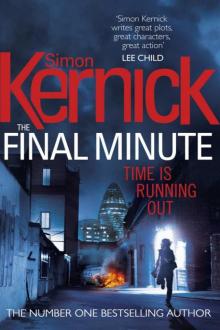 The Final Minute
The Final Minute We Can See You
We Can See You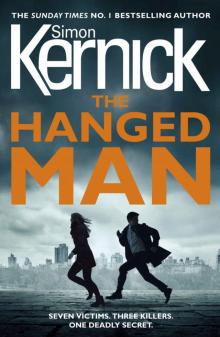 The Hanged Man (Bone Field 2)
The Hanged Man (Bone Field 2)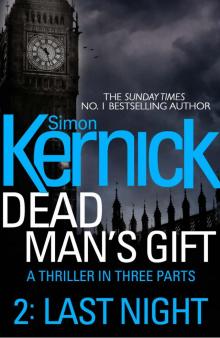 Dead Man's Gift 02 - Last Night
Dead Man's Gift 02 - Last Night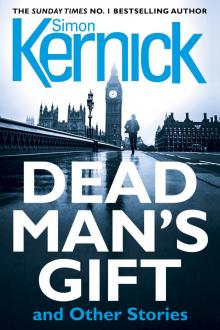 Dead Man's Gift and Other Stories
Dead Man's Gift and Other Stories A Good Day To Die
A Good Day To Die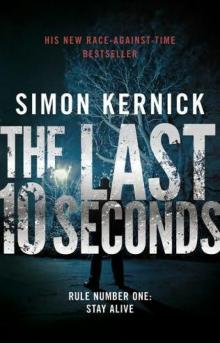 The Last 10 Seconds
The Last 10 Seconds The Murder Exchange
The Murder Exchange The Bone Field
The Bone Field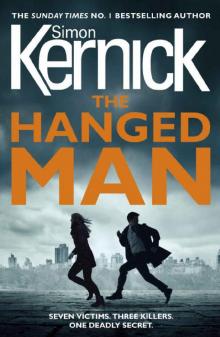 The Hanged Man
The Hanged Man Target
Target The Last 10 Seconds: A Novel
The Last 10 Seconds: A Novel Relentless: A Novel
Relentless: A Novel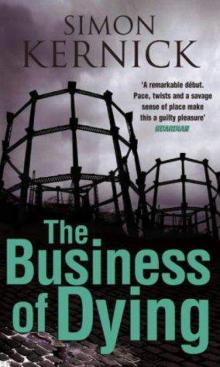 The Business Of Dying
The Business Of Dying Die Twice
Die Twice Flytrap
Flytrap Stay Alive
Stay Alive Dead Man's Gift 03 - Today
Dead Man's Gift 03 - Today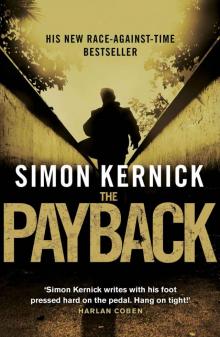 The Payback
The Payback Siege: A Thriller
Siege: A Thriller The Crime Trade
The Crime Trade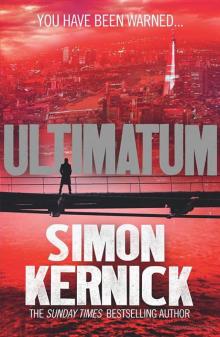 Ultimatum
Ultimatum